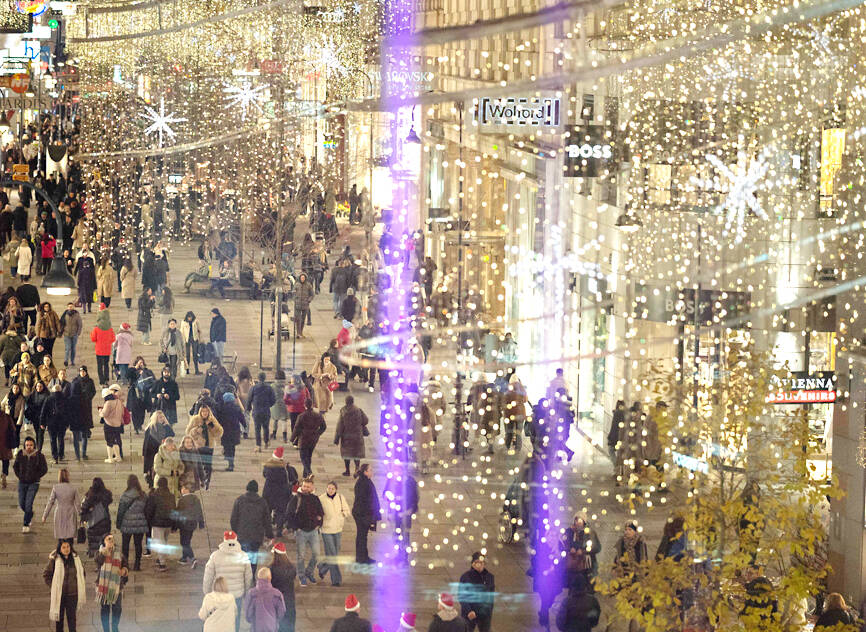Vienna would splash the cash on lighting up its famed Christmas markets to bring festive cheer to struggling retailers.
Chandeliers, glittering stars and sparkling red globes are among the designs illuminating 31 Viennese streets since Friday, with the capital boosting spending on its end-of-year light displays as Austria’s economy flounders.
“It’s just beautiful. It makes the city a bit more beautiful as a whole,” said Kateryna Baranovska, a 23-year-old student.

Photo: AFP
With local businesses increasingly unable to fork out the sums needed to keep the Christmas lights on, Vienna and its economic chamber would cover 75 percent instead of 50 percent of this year’s costs, or about 700,000 euros (US$737,921) for the lighting alone.
The small Alpine nation’s economic outlook has been gloomy since mid-2022, particularly as it is exposed to the difficulties of neighboring Germany, its main trading partner.
“We want to have a beautifully lit city and it is becoming increasingly difficult for entrepreneurs to cover these costs,” said Dieter Steup, a representative of the Vienna economic chamber.
“It is very important because the pre-Christmas period is a really important time for retailers,” he said, adding that people enjoyed shopping more under the Christmas lights.
Stored in a large warehouse on Vienna’s outskirts, workers began putting up the massive Christmas light motifs weeks before the on switch was flicked.
In an effort to lessen the impact on the climate, Vienna introduced LED lights in recent years, while the electricity needed to keep the displays twinkling from this month until January comes from renewable sources.
That energy is roughly equivalent to what a 14-apartment building uses in a year.
“The costs are actually relatively low for what you get in return, namely a good ambiance and a great atmosphere for shopping,” Steup added.
Activist group Greenpeace also said consumer behavior, including the buying of unneeded gifts, was a greater contributor to the Christmas season’s carbon footprint, with lights “hardly significant.”
In a 2022 survey, 64 percent of Austrians said the festive light displays created “a pleasant, Christmassy atmosphere” for them.
In 2022, when energy costs shot up because of Russia’s invasion of Ukraine, the Christmas lights were turned off two hours earlier to save electricity.
Since last year, the displays have again sparkled bright until midnight.

With an approval rating of just two percent, Peruvian President Dina Boluarte might be the world’s most unpopular leader, according to pollsters. Protests greeted her rise to power 29 months ago, and have marked her entire term — joined by assorted scandals, investigations, controversies and a surge in gang violence. The 63-year-old is the target of a dozen probes, including for her alleged failure to declare gifts of luxury jewels and watches, a scandal inevitably dubbed “Rolexgate.” She is also under the microscope for a two-week undeclared absence for nose surgery — which she insists was medical, not cosmetic — and is

CAUTIOUS RECOVERY: While the manufacturing sector returned to growth amid the US-China trade truce, firms remain wary as uncertainty clouds the outlook, the CIER said The local manufacturing sector returned to expansion last month, as the official purchasing managers’ index (PMI) rose 2.1 points to 51.0, driven by a temporary easing in US-China trade tensions, the Chung-Hua Institution for Economic Research (CIER, 中華經濟研究院) said yesterday. The PMI gauges the health of the manufacturing industry, with readings above 50 indicating expansion and those below 50 signaling contraction. “Firms are not as pessimistic as they were in April, but they remain far from optimistic,” CIER president Lien Hsien-ming (連賢明) said at a news conference. The full impact of US tariff decisions is unlikely to become clear until later this month

GROWING CONCERN: Some senior Trump administration officials opposed the UAE expansion over fears that another TSMC project could jeopardize its US investment Taiwan Semiconductor Manufacturing Co (TSMC, 台積電) is evaluating building an advanced production facility in the United Arab Emirates (UAE) and has discussed the possibility with officials in US President Donald Trump’s administration, people familiar with the matter said, in a potentially major bet on the Middle East that would only come to fruition with Washington’s approval. The company has had multiple meetings in the past few months with US Special Envoy to the Middle East Steve Witkoff and officials from MGX, an influential investment vehicle overseen by the UAE president’s brother, the people said. The conversations are a continuation of talks that

CHIP DUTIES: TSMC said it voiced its concerns to Washington about tariffs, telling the US commerce department that it wants ‘fair treatment’ to protect its competitiveness Taiwan Semiconductor Manufacturing Co (TSMC, 台積電) yesterday reiterated robust business prospects for this year as strong artificial intelligence (AI) chip demand from Nvidia Corp and other customers would absorb the impacts of US tariffs. “The impact of tariffs would be indirect, as the custom tax is the importers’ responsibility, not the exporters,” TSMC chairman and chief executive officer C.C. Wei (魏哲家) said at the chipmaker’s annual shareholders’ meeting in Hsinchu City. TSMC’s business could be affected if people become reluctant to buy electronics due to inflated prices, Wei said. In addition, the chipmaker has voiced its concern to the US Department of Commerce